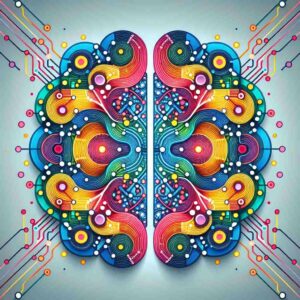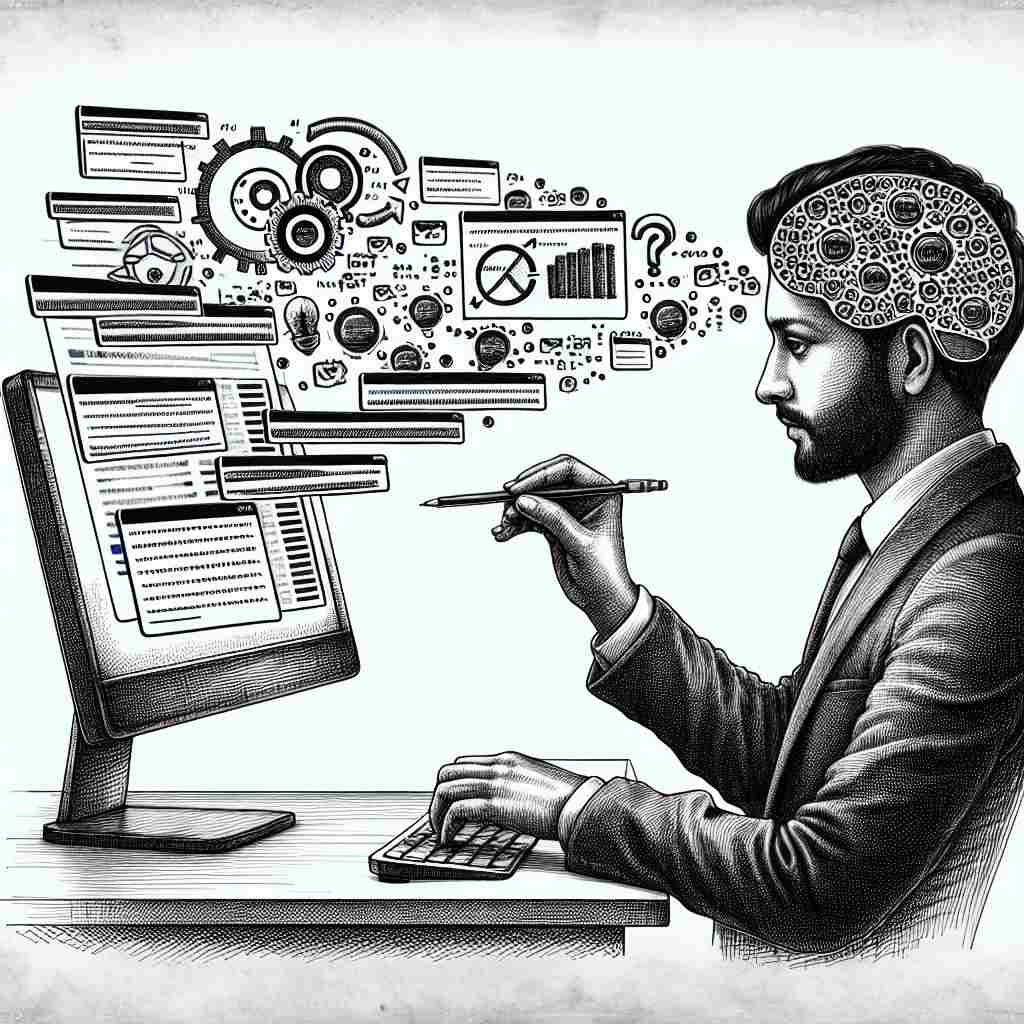In today’s technologically-driven world, Artificial Intelligence (AI) plays a pivotal role in reshaping various industries, and Pay-Per-Click (PPC) advertising is no exception. By leveraging AI, PPC practitioners can turn vast amounts of data into actionable insight, driving more profitable campaigns while reducing manual labour. So, what exactly does ‘AI for PPC’ entail?
On the most basic level, AI is a system that mimics human intelligence to execute tasks that usually require human understanding. When applied to PPC advertising, this technology is capable of analysing massive datasets and producing insights faster than any human ever could. The use of AI in PPC management can lead to improved ad targeting, optimized bids, and ultimately, increased return on investment (ROI).
While these feats of AI deployment paint an optimistic outlook for the PPC industry, it’s critical to remember that effective use of AI for PPC advertising isn’t just a matter of flicking a switch. Achieving meaningful results with AI requires a deep understanding of the technology, its capabilities, and most importantly, how to apply it within the context of your specific objectives and business model.
In the following sections, we will delve deeper into understanding the important role of AI tools in PPC management, the concept of AI-powered targeting and ad optimization, and strategies for leveraging AI effectively in your ad campaigns. We’ll also explore how AI is changing the roles of account managers and discuss future trends in the PPC industry driven by AI.
Importance of AI Tools in PPC Management
The advent of AI tools has radically changed the face of PPC management. Instead of spending hours manually adjusting bids, optimizing keywords and assessing ad performance, marketers can leverage these tools to automate tedious tasks, make more informed decisions and ultimately improve their overall campaign effectiveness.
Companies apply different AI algorithm models – from predictive modelling to deep learning and natural language processing – tailored towards solving unique challenges in PPC. The key lies not just in leveraging any tool but choosing the right one that aligns with your specific PPC objectives.
For example, if your aim is to optimize ad spend and prevent fraud, tools like CHEQ can be an excellent option. Simultaneously, a platform like Acquisio would be better suited for those looking to automate their campaign management and leverage machine learning for ad optimization.
The advantages of AI in PPC management are apparent – it not only reduces time and effort spent on mundane tasks but also provides actionable insights that directly improve campaign performance. However, the application of these tools requires a certain level of expertise. Marketers must understand the underlying principles of AI algorithms to use these tools most effectively and interpret the data they generate accurately.
In conclusion, AI tools offer immense potential in enhancing our PPC campaigns by automating processes, predicting user behaviour, preventing ad fraud, and much more. As marketers globally continue adopting these tools in their PPC strategies, we can expect a considerable shift towards more efficient and data-driven advertising practices.

AI-Powered Targeting and Ad Optimization
The benefits of AI carry far beyond simplifying PPC management through automation. One of its significant advantages lies in its potential to enhance ad targeting and optimization. Let’s delve more into how AI can refine these two critical aspects.
AI for Ad Targeting:
For any advertising campaign, reaching out to the right audience is crucial. This is where AI-based ad targeting steps in. By analysing patterns in user behaviour, AI algorithms can single out commonalities among your key audience – their demographics, interests, purchase history, etc., offering advertisers a goldmine of insights to finetune their targeting strategy.
An article in Search Engine Journal discussed how AI could be used to determine individual consumer intent based on their online activities. The predictive intelligence of AI allows marketers to anticipate the needs of consumers before they even realize it themselves, leading to highly personalized ads that resonate best with them.
AI for Ad Optimization:
Optimization hones your ad campaign performance – ensuring your ads are being shown at optimal times and getting you the most value from your spend. Here again, AI comes as an asset.
A piece on Invoca’s blog highlights that by utilising machine learning algorithms, businesses can establish the best performing keywords and allocate resources accordingly. It further brings up how AI aids in optimizing ad creatives – testing various headlines, descriptions and images to identify which combination delivers the highest engagement rate.
Besides this, automated bidding systems powered by AI such as Google’s Smart Bidding take optimization a step further by leveraging machine learning to maximize conversions within a set budget.
In essence, the role of AI in ad targeting and optimization is to refine strategy by delivering accurate customer segmentation and optimizing all elements of your ads for improved performance. By doing so, it helps advertisers reach the right audience at the right time with the right message – paving the way for increased conversions.
As advanced as these techniques sound, they’re no longer just reserved for big-budget corporations. With the availability of AI-powered PPC management tools, even smaller businesses can take advantage of AI’s potential in ad targeting and optimization. It’s no surprise that more companies are moving towards harnessing AI’s power to drive their PPC campaigns.
It’s crucial to remember that while AI provides valuable insights and automation, human intervention holds equal importance. Knowledge of your audience, competitors and market dynamics round off what AI algorithms might miss. Using both AI technology and human insight will ensure a holistic approach towards designing your PPC strategy.
In conclusion, AI’s integration with PPC not only simplifies manual tasks but also takes ad targeting and optimization to another level. It signifies a paradigm shift in how we approach digital advertising – making it less of a guessing game and more data-driven strategic planning backed up by actionable insights.

Strategies for Utilizing AI for Effective Ad Campaigns
While understanding the role of AI in PPC is essential, it’s equally crucial to learn how to effectively apply this powerful technology in your ad campaigns. Informed application of AI can lead to enhanced outcomes such as improved campaign metrics and better overall performance. Let’s explore some key strategies:
1. Dynamic Keyword Discovery:
One effective way of using AI in PPC is through dynamic keyword discovery. A piece from WebFX highlights that machine learning algorithms can analyse consumer behaviour patterns and suggest relevant keywords advertisers might not have previously considered. Implementing these unique, less competitive keywords into your PPC strategy can bolster your visibility by reaching a wider yet more targeted audience.
2. Personalized Ad Content:
AI technology can also help create personalized ad content that resonates with your target audience, increasing engagement and boosting conversions. Suggestions made by an article on GoodFirms, include using AI’s data analysis capabilities to understand customer preferences and behaviours, then tailoring your ad content accordingly. This could range from changing the language tone based on audience demographics to adjusting offers based on user behaviour.
3. Leveraging Predictive Analytics:
Predictive analytics is another powerful tool fuelled by AI that can significantly enhance your PPC campaigns’ effectiveness. By analysing past user interactions, predictive models can determine future consumer behaviour trends. For instance, you might notice a pattern of increased engagement during specific hours or days, enabling you to schedule ads when they’re most likely to get noticed.
4. Experiment with Automated Bidding:
AI-powered automated bidding strategies can manage your bids in real-time to maximize results based on your set goals, be it maximizing clicks, conversions, or impression share. It continuously analyses numerous data points to adjust bids for each auction, something human managers would struggle to achieve manually.
5. Real-Time Ad Optimization:
Similar to keyword discovery and bidding, AI algorithms can optimize ads in real-time based on performance. This could include changing the ad layout, tweaking the call-to-action or adjusting the messaging based on what’s working best.
In conclusion, leveraging these AI-driven strategies in PPC campaigns can help advertisers stay ahead of competition and consistently deliver effective campaigns tailored to their unique audience’s preferences and behaviour. Remember that implementing AI is not about making advertising efforts entirely autonomous but using smart automation to make more informed decisions faster and more precisely than ever before.
Impacts of AI on PPC Account Managers & Industry Trends
The advent of AI in PPC is not just changing the landscape of advertising but also transforming the roles of account managers while driving innovative industry trends. With AI automating numerous processes from ad targeting to optimization, the role of PPC account managers is being redefined and augmented. Let’s explore this transformation and how AI is contributing to emerging trends within the industry:
1. Transformation of Account Management Roles:
AI is impacting the work of PPC account managers by shifting their focus from manual tasks to strategic decision-making. As per a Search Engine Land article, with AI taking over tedious tasks like bid adjustments and keyword discovery, the emphasis for managers is moving towards interpreting insights generated by AI tools and making informed strategic decisions based on them.
In other words, it’s not about replacing human operators, but rather redefining their roles to leverage their human intelligence more creatively and strategically. Human intuition combined with machine precision can drive better campaign outcomes and performance.
2. Enhanced Decision Making:
AI algorithms are also helping in enhancing decision-making for PPC account managers. By analysing vast amounts of data, they can provide insights and predictive analytics which assist in making more accurate forecasts and decisions about campaign strategies.
3. Data-driven Strategies:
Another transformative impact of AI on PPC management involves its instrumental role in shaping data-driven strategies. It enables marketers to move away from speculation-based actions towards fact-based decision-making. The powerful analytical capabilities of AI provide deep insights into audience behaviour, campaign performance, market trends, etc., which are pivotal for devising effective PPC strategies.
4. Industry Trends Driven by AI:
AI is contributing to several emerging trends in the PPC industry. AI is enabling real-time bidding and programmatic advertising, allowing advertisers to automate buying, placement, and optimization of media inventory via bidding system – making processes more efficient and reducing manual effort.
Trend #2: Personalization has taken centre stage with AI’s ability to leverage data for creating highly personalized ad experiences based on user behaviour and preferences. This trend leads to improved ad relevance, engagement, and ultimately better conversion rates.
5. Introducing System Enhancements:
AI is being used to introduce system enhancements that can make PPC ad campaigns more efficient and effective. These improvements can range from automating mundane tasks to sophisticated forecasting tools that help predict performance outcomes based on historical data.
In conclusion, the integration of AI into PPC management is transforming the industry landscape by redefining roles, driving innovative trends, and introducing enhancements in system operations. As we move forward with these advancements, it’s evident that those who stay abreast of these changes stand to gain the most out of their PPC campaigns.

Future of AI for PPC Advertising
The future of PPC advertising is undoubtedly intertwined with the advancements in Artificial Intelligence (AI) technology. As machine learning algorithms become more sophisticated and AI capabilities grow, we can expect to see significant transformations in how PPC campaigns are managed and optimized. Let’s take a closer look at what the future holds for AI in PPC advertising:
1. Generative AI and Advanced Language Models:
As language models like OpenAI’s GPT-3 continue to evolve, they present exciting opportunities for PPC ad copy generation. These advanced models can analyse vast amounts of data and generate highly persuasive and targeted ad content automatically. Advertisers can save time and effort by leveraging generative AI to create compelling ad copy that resonates with their audience.
2. Increased Automation in PPC Campaigns:
Automation has been a significant trend in PPC advertising, driven by AI technology. In the future, we can expect even greater levels of automation, where AI algorithms handle various aspects of campaign management without human intervention. This includes tasks such as bid optimization, keyword targeting, A/B testing, and performance analysis. With more precise automation, advertisers can focus on strategic decision-making rather than time-consuming manual tasks.
3. Advanced Audience Targeting:
AI-powered audience targeting will continue to advance, enabling advertisers to reach their desired audience with unprecedented precision. As AI algorithms analyse user behaviour patterns, demographics, interests, and purchase history, advertisers can refine their targeting strategies to ensure that their ads are shown to the most relevant audience. This will lead to higher conversion rates and increased ROI for PPC campaigns.
4. Improved Personalization:
Personalization is expected to play a crucial role in the future of PPC advertising. AI technology enables marketers to deliver highly personalized ad experiences based on individual user preferences and behaviours. By analysing vast amounts of data in real-time, AI algorithms can determine the most effective messaging, offers, and creative elements for each specific user segment. This level of personalization will result in more engaging ads and higher conversion rates.
5. Enhanced Performance Analysis:
In the future, AI-powered analytics tools will provide advertisers with deeper insights into their campaign performance. Machine learning algorithms will analyse complex data sets and deliver actionable insights on metrics such as click-through rates (CTR), conversion rates, cost per acquisition (CPA), and return on ad spend (ROAS). This will allow advertisers to make data-driven decisions to optimize their campaigns and maximize their marketing budgets.
6. Voice Search Optimization:
Voice search is rapidly gaining popularity with the increasing adoption of virtual assistants such as Amazon Alexa, Google Assistant, and Apple Siri. In the future, AI algorithms will play a critical role in optimizing PPC campaigns for voice search queries. Advertisers will need to adapt their keyword targeting strategies to include long-tail conversational phrases that align with how people speak rather than type queries into search engines.
7. Integration with other Emerging Technologies:
Apart from advancing on its own merits, AI will also integrate with other emerging technologies to further enhance PPC advertising efforts. For example, the combination of AI and Augmented Reality (AR) could enable advertisers to deliver immersive ad experiences by overlaying digital content onto real-world environments through mobile devices or smart glasses.
The possibilities are vast when it comes to combining AI with other technologies like Internet of Things (IoT), blockchain or Virtual Reality (VR). These integrations could open up new avenues for interactive and hyper-targeted advertising experiences that blur the line between physical and digital realms.
In conclusion, the future of PPC advertising lies in harnessing the power of Artificial Intelligence (AI). With ongoing advancements in machine learning algorithms and an increasing reliance on automation, we can expect more efficient campaign management processes, enhanced audience targeting capabilities, improved personalization techniques, advanced performance analysis tools, optimized voice search strategies, integration with emerging technologies – all leading towards delivering more impactful results for advertisers worldwide.

